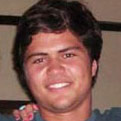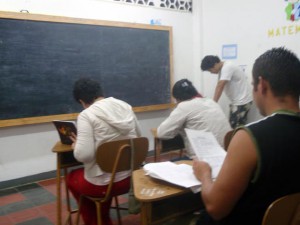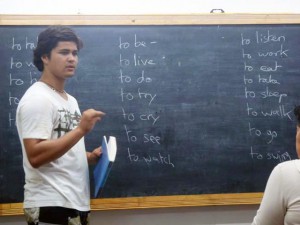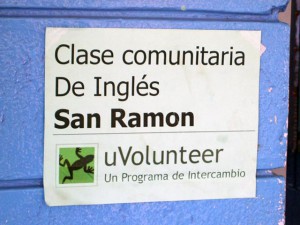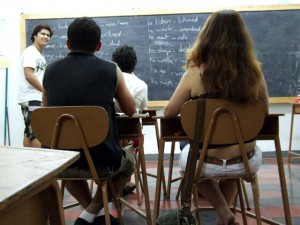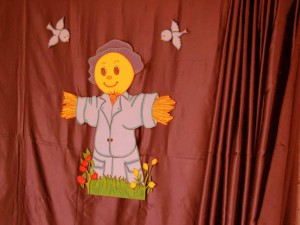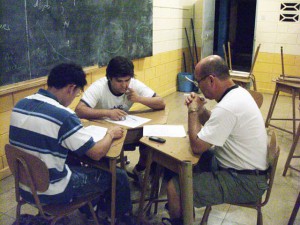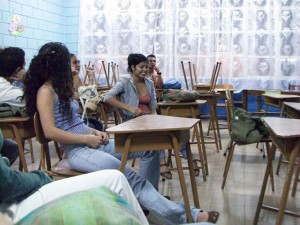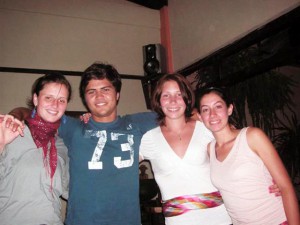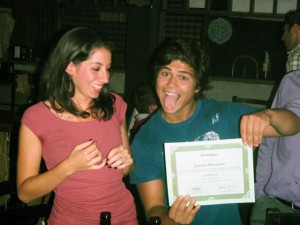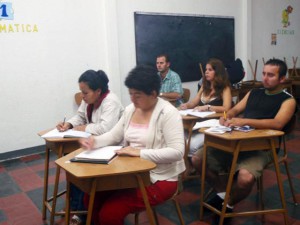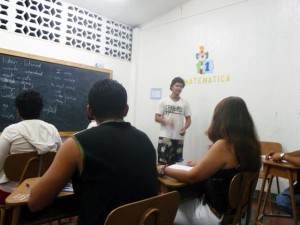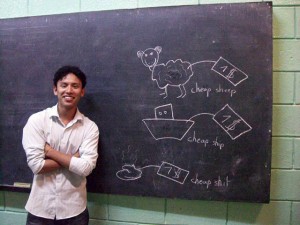My first day of class, we gave the students a test in order place them in 3 groups of different levels: beginners, intermediate and advanced. After one week, with the arrival of another volunteer, I ended up giving classes to beginner, advance and one earlier class to employees of a supermarket.
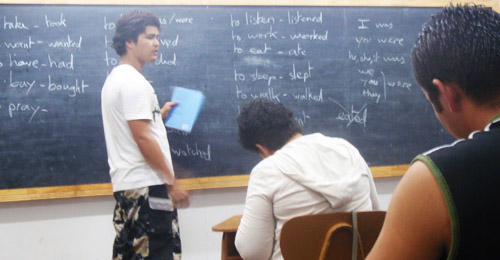
Your greatest asset when you teach night classes is the motivation of the students, they all come their own initiative and with a genuine desire to learn.
The beginners had very limited or no knowledge of English to begin with, so it is of great help to speak some Spanish in order to explain but also for the students to feel more comfortable speaking with you. Remember that even though the students are motivated to learn, it is still very normal for them to be shy, especially if they feel they are talking to a complete stranger. It took me the first week to get the class into a comfort zone. Now, in my third week, they are practicing basic conversation, questions and answers, and take any error they might make with a smile.
The advanced class is a true pleasure to teach, most of them can handle a conversation in English with only some errors and hesitations. This class is mostly focused on conversation. Last week, they all presented the homework I had given them previously, a 10 minute presentation about a topic of their choice concerning Costa Rica. In this way I also get to learn a lot about their country. Most of the presentations ended up lasting the whole hour, including the debate. The students are all eager to talk and share their different opinions, creating and interesting and entertaining conversation.
PART II
I chose to apply for uVolunter’s Costa Rica program only after searching through and considering a minimal of other organizations some different factors made me apply for uVolunteer. First and foremost, the price is unlocatable. uVolunteer is a small, relatively fresh organization and based locally, which allows them to keep it affordable. Secondly, as my main goal had been to learn Spanish, I was attracted by the possibility to take some weeks of Spanish classes in Samara’s Intercultural school before starting with the volunteer placement. Also, the English teaching program in San Ramon started with me, which meant I had quite some freedom in the teaching process. I had some general guidelines to help me but I really was in control of what to teach and what methods to use.
After having Spanish three weeks in Samara, I moved to San Ramon. The first thing that struck me was the pleasant climate: Samara is very hot and humid while San Ramon is warm and sunny but shill, deliciously fresh. There is always a cool little breeze. More than anything, through, it was good just to move to a bigger city. San Ramon and its environments offer enough activities to keep you busy. The city has good cafes, plenty of bars and places to eat out and a couple of night clubs. UCR (university of Costa Rica) has a campus here, with some thousands students many of whom attended my English classes and became good friends.
San Ramon is located in the centre of the country and has a lot of interested places to visit close by: Sarchi, the craft man’s town, arenal volcano in la fortuna, los angeles cloud forest, the beaches of Puntarenas and also the ones in Guanacaste are possible to visit over a week and the buses here are reliable and comfortable. There are three main stations in San Ramon, two in the city and one on the highway.
My host families, both in Samara and San Ramon were absolutely fantastic. I applied for home stay so I could practice my Spanish, meet the locals and get a real taste of Costa Rican culture.
I was not disappointed. They were all friendly and welcoming and quickly made me feel at home in their house. I was taken to local town celebration, to a fishing pond, to the beach, the food is delicious and never scare, if anything it is I who have to beg mami to please stop feeding me.
The English teaching program satisfied all expectations. It was purposeful, interesting, entertaining, I learned a lot myself, and looking back, I feel that it has been an important positive experience for me. Among other projects, my main task was teaching two night classes for adults, each of them four times a week, from Monday to Thursday at a local school. One group consisted of beginners and the other of more advanced students. The beginners hardly knew any English when they first came; I had to start with the very basics. It is often hard to find out where to begin, what to start teaching. The organization provided a suggested curriculum and a lot of materials to use, so I started with that, but as my confidence grew and after talking with the students.
The further teaching of the class according to what they wanted to learn.In 8 weeks, we went over basic conversation, question and answers, conjugation in basic tenses, vocabulary, prepositions, I did speak some Spanish in the classroom and although it might seem as an anvantage to master Spanish it is easy to fall into a habit of using it to much in class.
I do not think is necessary to speak Spanish to teach this class. The advanced class consists mostly of university students, some of them majoring in English. They know all the grammar, all the rules. What they really lack is just practice. We did written exercises but the class was mostly focused on conversation. We did oral presentations, had class debates, comprehension, additive exercises, learned to write resumes and job applications and analyzed poetry.
